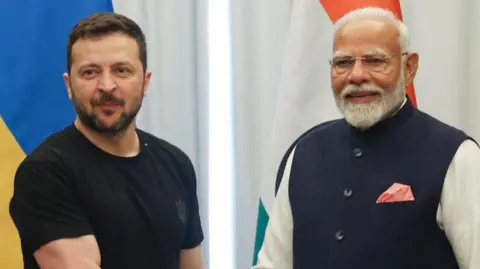 PIB India
PIB IndiaIndian Prime Minister Narendra Modi will visit Ukraine on Friday to hold talks with Ukrainian President Volodymyr Zelensky. The visit comes weeks after he met with Russian President Vladimir Putin in Moscow.
The visit was notable because Kiev and some Western capitals reacted strongly Mr. Modi’s visit to the Russian capital The month of July.
Mr Zelensky was particularly critical, saying he was “disappointed to see the leader of the world’s largest democracy hugging the world’s bloodiest criminal in Moscow”.
So, is Mr Modi going to Kiev to appease Mr Zelensky and other Western leaders?
Absolutely not.
It is not surprising to see India balancing its relations between two rival countries or groups. The country’s famously non-aligned approach to geopolitics has served it well over the decades.
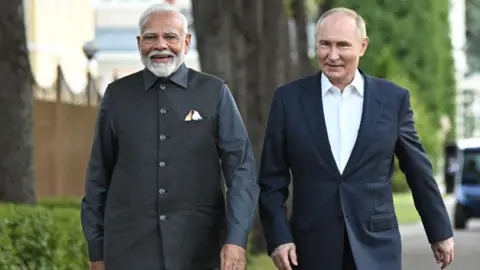 Good pictures
Good picturesAn Indian prime minister’s first visit to Ukraine on Friday – a sign that while India will continue to have strong ties with Russia, it will work closely with the West.
Michael Kugelman, director of the South Asia Institute at the Wilson Center think tank in Washington, says the visit will further assert India’s strategic autonomy.
“India is not in the business of appeasing Western powers or anyone. “This is a trip to advance Indian interests by re-establishing friendship with Kyiv and conveying its concerns about the ongoing war,” he says.
The timing of the visit, however, reflects that Indian diplomats have accepted the tough US reaction to Mr Modi’s visit to Moscow.
is in India He avoided directly criticizing Russia About the war, much to the annoyance of the Western powers.
However, Delhi often talks about the importance of respecting territorial integrity and the sovereignty of nations. It has continued to push for diplomacy and dialogue to end the war.
Mr Modi’s visit to Moscow in July came hours after Russian bombings in Ukraine killed at least 41 people, including at a children’s hospital in Kiev, sparking global protests.
India’s prime minister said the death of the children was painful and horrifying, but stopped short of blaming Russia.
Mr Modi is unlikely to deviate from this stance during his visit to Kiev. Because of India’s time-tested relationship with Moscow and reliance on Russian military equipment, the US and other Western countries have grown to accept Delhi’s position.
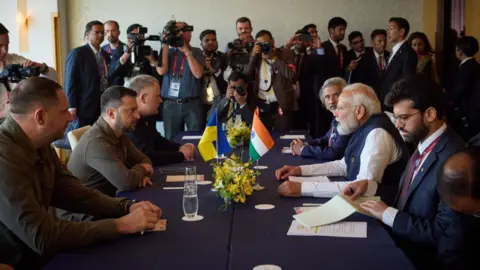 Good pictures
Good picturesIndia, the world’s largest arms importer, has diversified its defense import portfolio and grown domestic production in recent years, but it still buys more than 50% of its defense equipment from Russia.
Taking advantage of the cheap prices offered by Moscow, India has increased its oil imports from Russia – Russia was India’s biggest oil supplier last year.
The US and its allies have often asked India to take a clear stand on the war.
The West views India as a counterbalance to China and does not want to disrupt that dynamic. India, now the fifth largest economy in the world, is also a growing market for business.
Mr Kugelman says the West will welcome the visit and Delhi’s willingness to engage with all sides.
“Mr Modi has a strong incentive to convey to Moscow that he has nothing to save with Kiev,” he says.
This is important because India wants to develop its relations with the West, especially the US, and does not want to disrupt the momentum. US Ambassador to India Eric Garcetti recently said the relationship “should not be taken for granted”.
India also needs the West as its Asian rivals China and Russia have forged closer ties in recent years.
While Delhi has long viewed Moscow as a power that can exert pressure on a assertive China when necessary, it cannot be taken for granted.
Meanwhile, many media commentators have spoken of the possibility of Mr Modi positioning himself as a peacemaker, given India’s close ties to Moscow and the West.
But it is unlikely that he will return with a peace plan.
“Does India actually accept it, are the conditions right? Other countries don’t like India trying to mediate on its own issues, chief among them Kashmir. I don’t think Mr Modi will formally mediate unless both Russia and Ukraine are willing. At this point, I don’t think they do,” adds Mr Kugelman.
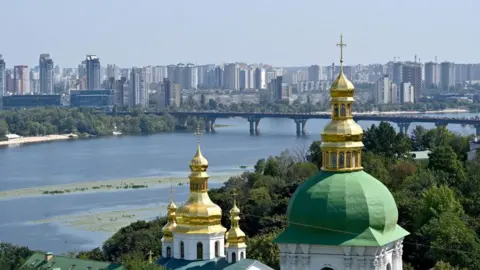 Good pictures
Good picturesHowever, Ukraine will still welcome Mr Modi’s visit and see it as an opportunity to engage with Moscow’s closest ally, which has not done much since the war began.
Mr Zelensky, however, is unlikely to stop his criticism of Mr Putin in the presence of the Indian prime minister. Mr Modi can live with this as he has faced similar situations many times in other Western capitals.
Moscow is unlikely to react to the visit as it makes concessions to Delhi’s multilateral approach to geopolitics.
But beyond reiterating its non-aligned policy, Delhi has bigger goals with the visit.
Over the past decade, India has been increasingly engaging with Europe, particularly the underdeveloped regions of Central and Eastern Europe.
Delhi wants to strengthen its ties with the Big Four, UK, Italy, Germany and France, but also wants to increase its engagement with other countries in Europe.
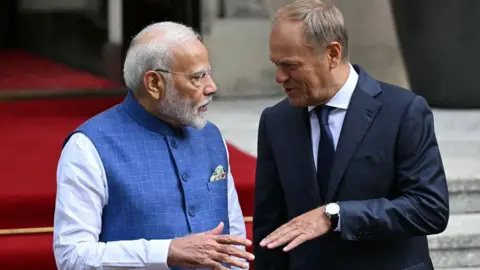 Good pictures
Good picturesThe trip will also see Mr Modi visit Poland – the first Indian Prime Minister to visit the country in 45 years. He also became the first Indian Prime Minister to visit Austria in July in 41 years.
Analysts say this reflects India’s growing understanding that Central European countries will play a larger role in geopolitics in the future, and that stronger ties with them will serve Delhi well.
The Government of India has also renewed trade agreement negotiations with Europe. It has signed a trade and investment agreement with the European Free Trade Association, an intergovernmental organization of Iceland, Liechtenstein, Norway and Switzerland.
So, while much of the focus will be on the war during his visit, Indian diplomats are likely to focus on the larger goal.
“Central and Eastern Europe now has more agency in writing their own destiny and reshaping regional geopolitics. “Mr Modi’s visit to Warsaw and Kyiv is an acknowledgment of that important shift in Europe’s focus and deepening of bilateral political, economic and security ties with Central European countries,” wrote foreign policy analyst C Raja Mohan. Indian Express The paper sums up Mr Modi’s broader goal.
